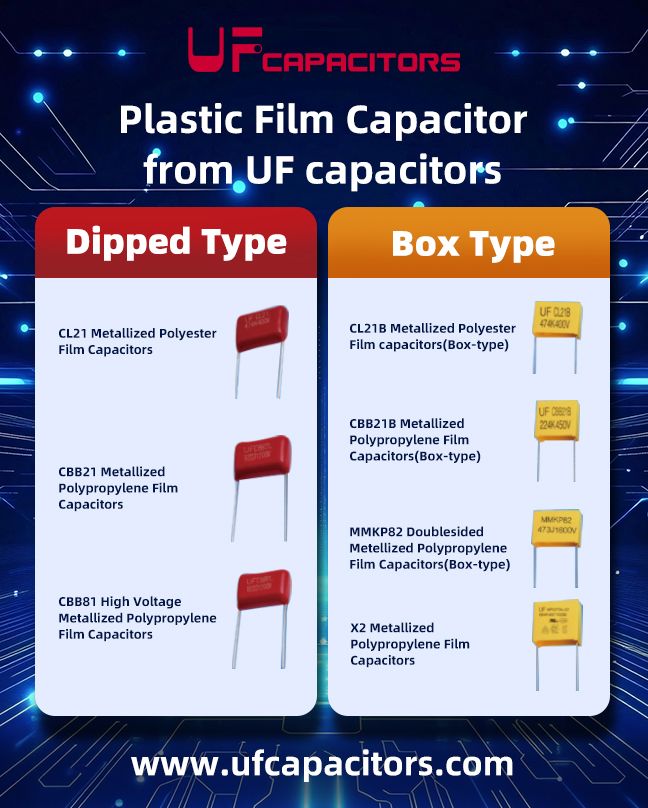In the rapidly advancing world of electronics, the demand for efficient, reliable, and high-performance components is greater than ever. For engineers designing high-frequency power supplies, the choice of capacitor is critical. Among the various options, the film capacitor stands out as a premier solution, especially those with self-heal properties. Sourcing these components from a leading capacitor factory in China, like UF Capacitors, provides a competitive edge, offering products that can effectively replace renowned brands such as TDK and Kemet.
Film capacitors are constructed using a thin plastic film as the dielectric, which is metalized and wound into a compact design. This construction is inherently well-suited for high frequency applications due to several key advantages:
Low ESR and ESL
Film capacitors exhibit exceptionally low Equivalent Series Resistance (ESR) and Equivalent Series Inductance (ESL). This is paramount in high-frequency switching environments (like those found in SMPS - Switch-Mode Power Supplies) because it minimizes energy losses and heat generation, leading to higher efficiency and more stable performance.
Excellent Frequency Response
Their design allows them to maintain stable capacitance over a wide frequency range. This ensures consistent filtering, smoothing, and decoupling performance even as operating frequencies in modern power electronics continue to climb.
High Ripple Current Handling
Power supplies subject capacitors to high ripple currents. The robust construction of film capacitors allows them to handle these currents effectively, preventing overheating and ensuring long-term reliability.
A defining feature of modern metalized film capacitors is the self-heal mechanism. If a small dielectric breakdown occurs due to an overvoltage spike or imperfection, the immense energy concentrated at the fault point vaporizes the thin metalized electrode surrounding the fault. This electrically isolates the defect, allowing the capacitor to continue operating with only a negligible loss of capacitance.
This self-heal capability is a game-changer for high-frequency power applications, where transients and stress are common. It dramatically enhances the reliability and longevity of the capacitor, reducing the risk of catastrophic failure and the need for maintenance.
Film capacitors are ubiquitous in power electronics. Their high-frequency prowess makes them indispensable for:
EMI/RFI Filtering
Placed across input lines to suppress electromagnetic and radio-frequency interference, ensuring compliance with international standards.
DC-Link Capacitors
In inverters and converters, they smooth the rectified DC voltage, requiring low ESR and high ripple current capability.
Snubber Circuits
Used to protect sensitive semiconductor devices (like IGBTs and MOSFETs) from voltage spikes during high-frequency switching.
Resonant Circuits
Their stable parameters are crucial in resonant converters, which are prized for high efficiency.
Decoupling and Bypassing
Providing a local charge source and shunting high-frequency noise on power rails.
The global electronics industry increasingly relies on manufacturers from China for high-quality, cost-effective components. When it comes to film capacitors, finding a dependable capacitor factory in China is essential.
UF Capacitors has emerged as a prominent manufacturer, establishing a reputation for excellence that allows their components to be direct replacements for those from industry giants like TDK and Kemet. Here’s why designers are turning to UF Capacitors:
High-Quality Standards: They produce film capacitors that meet international performance and safety certifications.
Advanced Self-Healing Technology: Their products incorporate reliable self-healing metallization techniques.
Designed for High Frequency: Their portfolio includes capacitors specifically engineered for demanding high-frequency applications.
Cost-Effectiveness: They offer a significant price-to-performance advantage without compromising on reliability.
Drop-in Compatibility: Their components are often designed to be form-fit-function compatible with parts from TDK, Kemet, and others, simplifying the design-in and replacement process.
